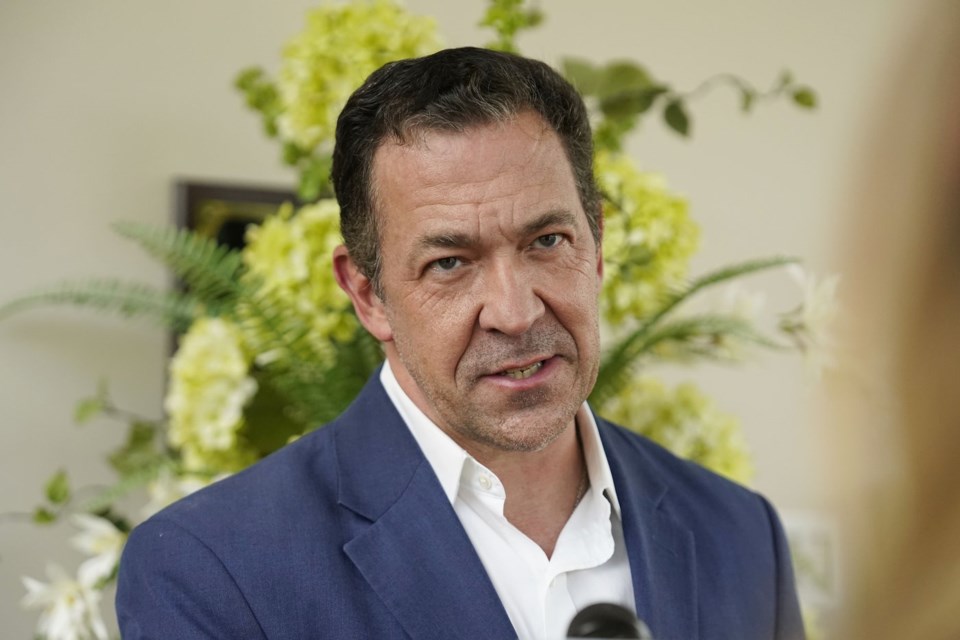FRANKFORT, Ky. (AP) — Kentucky lawmakers completed their work Tuesday to reduce the state’s individual income tax rate, delivering on a top Republican priority on just the fifth day of this year's session.
Final passage came on a 34-3 Senate vote to lower the tax to 3.5% from 4% at the start of 2026. The bill goes to Democratic Gov. Andy Beshear, who has said he supports the tax cut. It continues a downward trend in the personal income tax rate since the GOP gained full control of the legislature in 2017.
“It’s been said that there are only two things in life that are certain -– it’s death and taxes," Republican Sen. Chris McDaniel said during the debate Tuesday. "We’ve added another thing that’s fairly certain — which is the General Assembly is going to do everything in its power, and frequently with success, to lower your taxes. And that’s what House Bill 1 is all about.”
Supporters say the lower tax rate will promote long-term economic growth and population gains in the Bluegrass State by enabling people to keep more of the money they earn.
Sen. Cassie Chambers Armstrong, one of three Senate Democrats voting against the bill, said the results would be lopsided, with wealthy Kentuckians benefiting disproportionately from the tax cut.
The Democratic lawmaker said she values putting money back in Kentuckians' pockets, pointing to options she said would help struggling families most in need of tax relief. She touted a refundable child tax credit for low-income families and a sales tax exemption for diapers — proposals she is pushing.
That brought a quick response from Republican Sen. Michael Nemes, who touted the relief for Kentuckians provided in the income tax cut. “They earned it,” he said. "It’s their money, not ours.”
The latest income tax cut is expected to save taxpayers another $718 million annually, supporters said.
House budget committee Chairman Jason Petrie said last month that there’s a “tremendous amount of room to keep the budget balanced” with the lower individual income tax rate in 2026.
The measure won united support from Senate Republicans, while Democrats were divided on the issue.
Sen. David Yates, among the Democrats backing the bill, said it “feels safe” to lower the income tax in the current economic climate but added that the state should maintain a diverse tax structure. If the personal income tax keeps dropping until being eliminated, other taxes will increase, he said.
“Because you have to have taxes in order to run a system of government,” Yates said.
Cutting the state's personal income tax has been a recurring priority for Republican lawmakers.
Since the passage of a tax overhaul in 2022, the individual income tax in Kentucky has gradually been reduced by increments of a half-percentage point, conditioned on meeting benchmarks to ensure revenues are sufficient to meet state spending needs. State officials announced last year that the state had met the financial conditions needed to set in motion another cut in the tax rate for 2026.
As part of the tax overhaul three years ago, the state sales tax was extended to apply to more services. Critics say lower-income families were hurt the most by putting sales tax on more services.
The House overwhelmingly passed the latest income tax cut on the third day of this year's 30-day session in early January. Lawmakers met four days last month before heading home for the rest of January, which is customary in 30-day sessions in odd-numbered years.
The Senate took up the bill Tuesday, the first day that lawmakers reconvened since the January break. Republicans have supermajorities in both chambers, and the importance of the tax cut was reflected in it being designated as HB1, signifying its top-priority status.
With the latest personal income tax cut headed to the governor's desk, the next question will be when the rate will be reduced again and by how much.
Several Senate Republicans said Tuesday that the latest cut is another step toward what they hope is the ultimate result — eliminating the individual income tax.
GOP Sen. Gex Williams raised the prospect of making deeper incremental cuts in the income tax in future years, perhaps by three-quarters of a percent or a full 1%. Williams said he hopes that begins in the 60-day legislative session in 2026, when lawmakers will craft the state's next two-year budget.
“I am looking forward to this next session, that we will be able to strive for a greater than one-half percent cut,” Williams said.
Bruce Schreiner, The Associated Press



